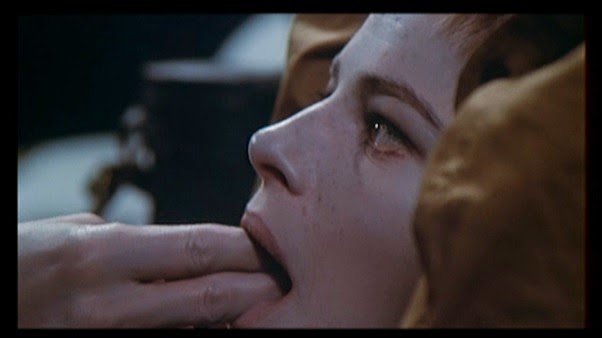Liliana Cavani’s protagonist Maximilian Theo Aldorfer (played by the wonderful Dirk Bogarde) describes his relationship and eventually separation with his captive Lucia Atherton (Charlotte Rampling) as a Biblical Story. There are no deaths and resurrection here, but the tragedy that forms the crux of this relationship sure evokes biblical maelstroms.
Slated as ‘Nazi Chic’ and received with mostly critical slashing at the time of its release, The Night Porter is a film that investigates a very complex relationship. A relationship which can very well be labelled as cheap, dirty and something that should be burnt instead of being talked about. But that’s exactly what Cavani’s point is. Some relationships are as destructive as a ticking time bomb. Some human tragedies can never be explained and some people are too broken to be fixed by a general normalisation.
A hotel in Vienna is the setting of Cavani’s dreadfully delirious investigation of a love that’s entirely established on the grounds of sadomasochism. Max (Dirk Bogarde) is a solitary night porter at this hotel and seems to be too good for his own will. His routine seems to be drenched in melancholia as he is ordered to do things for specific residents. He complies to all their wishes without batting an eyelash. Max had been a Nazi doctor in the past who often indulged in torture and experimentations on his patients. His secret in the contemporary society is closely sealed with a few trustworthy peers who check upon one another every now and then. Their idea is to make sure that their secret is safe within them. Max’s monotonous routine is however disrupted when one of the hotel guests turns out to be a former patient, or as Max would put it – his ‘Little Girl’, his treasure, his love.

The relationship between the two is destructive because Cavani often immerses her narrative in a series of flashbacks that throws us back to the time when Lucia was younger. She was a victim of mental and physical traumatizations which have scarred her for life. Her dilemma is quite evident when she sees Max (who was also one of the people who tortured her but also caressed her) for the first time after so many years. There’s an icebreaker kind of moment that stops all the cold shivers, the suspicious malice and sexual frustration between the two people in question. When it finally changes the feelings of repulsion to a sneering grin and the sexual tension is at all its highs.
When the two finally come to grounds, the flashbacks become reality again. Lucia becomes the little girl and Max is the power driven sexual cripple who couldn’t possibly let her go. She is a cripple too or is made that way by Max. Her idea of passion and love are no more the use of convenience, beautiful dresses and a sorted lifestyle. For her, the most beautiful dress in the world is the one that Max gave her when she was stripped down by the Nazi regime. The most convincing thing is when Max puts her in clutches and tells her that he can’t let her go, again. And the sorted lifestyle is no more a clique for her as she desires to be controlled and sodomised by him and only him.

Cavani presents this strange relationship that the two people share as love. But is it love really? From a certain fascist point of view – yes. Also from a certain nihilistic point of view – maybe. However, the general viewpoint of love that people have will often cancel out Cavani’s vision here. As far as I am concerned, in a very strange kind of way, I really believed in the love between the two characters. Yes, there’s always the question of morality and ethics, and setting the Holocaust as the trigger point of their love story doesn’t really seem all that convincing, but if Cavani’s aim was to make me empathise with their estranged relationship, I think she did it pretty well!
The Night Porter is the kind of cinema that doesn’t really fall square with everyone. Empathising with a love story that blossoms due to sadism and sadomasochism is a really tricky thing. However, Cavani scales the film in a way that it fascinates with provocative imagery. The kind that doesn’t let you take your eyes off it. The kind that questions the human beast inside you of being guilty of a crime that cannot be described.


